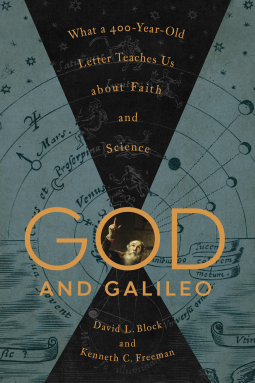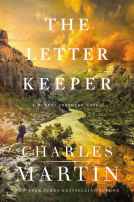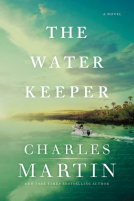
God and Galileo
What a 400-Year-Old Letter Teaches Us about Faith and Science
by ;
This title was previously available on NetGalley and is now archived.
Send NetGalley books directly to your Kindle or Kindle app
1
To read on a Kindle or Kindle app, please add kindle@netgalley.com as an approved email address to receive files in your Amazon account. Click here for step-by-step instructions.
2
Also find your Kindle email address within your Amazon account, and enter it here.
Pub Date May 31 2019 | Archive Date May 05 2019
Talking about this book? Use #GodAndGalileo #NetGalley. More hashtag tips!
Description
Using excerpts from a letter written by famed astronomer Galileo in 1615, two modern-day astronomers explore the relationship between science and faith, arguing that our notion of ultimate truth must include both the physical and spiritual domains.
A Note From the Publisher
PDF may not be compatible with all reading devices.
Advance Praise
“These two eminent astronomers, one from Australia and one from South Africa, bring a unique perspective to the faith and science arena. What they reveal about Galileo—who is often cited as an example of the great divide—demonstrates instead that strong faith and expert science can go together. Indeed, the authors themselves follow in Galileo’s path, approaching both fields with a spirit of humility and wonder.”
—Philip Yancey, author, What’s So Amazing About Grace? and The Jesus I Never Knew
“Galileo showed us how to write in the book of nature, but his world read only from the book of Scripture—thus descended a debate that tore Galileo’s world apart and has never been reconciled, even to our time. God and Galileo is a personal journey through the world of two books, nature and Scripture, guided by leading astronomers who have wondered, like many others, why we cannot seem to read clearly from both books at the same time. Their conclusion is that we can and, to reach our fullest understanding, we should. Galileo concluded the same but was not allowed to speak it. God and Galileo finally gives him a voice.”
—Bruce Elmegreen, Astrophysicist, Thomas J. Watson Research Center, IBM; recipient, Dannie Heineman Prize for Astrophysics (2001)
“With so many scientists seeing Christian faith as irrelevant to scientific truth and so many Christians seeing science as contradictory to Christian truth, this unique, groundbreaking, and deeply researched book by two believing, distinguished, and top-drawer astronomers is one that had to be written. It makes clear that the totality of truth has to be drawn on the one hand from the book of Scripture, with its story of grace and incarnation, and on the other hand from the book of nature, with its story of space and matter. Both books are vital to the full comprehension of reality, and the authors show this with convincing clarity. We dare not be blind either to nature or Scripture, whose respective truths are complementary, not contradictory, because both have the same author. God and Galileo brings us unique perspectives and insights related to faith, grace, and astronomy not evident in any other contemporary writing. My prayer is that it will be a landmark contribution to this debate and a classic both for today and for generations to come.”
—Michael Cassidy, Founder, African Enterprise; Honorary Cochair, Lausanne Movement; author, The Church Jesus Prayed For
“God and Galileo needed to be written. The majority of scientists today are either atheist or agnostic, and there is rarely any discussion about the relationship between the physical and spiritual realms of knowledge. In scientific circles, these subjects mix like oil and water. Yet the relationship between a Creator and the origin of the universe is an important subject of fundamental interest to everyone. Is there a connection between science and religion, or are the two in conflict as completely independent realms of knowledge? This book addresses this question head-on. Written by two leading international researchers in astronomy, the book reflects extensively on the interaction between the universe of space and the God of grace. To make their point, the authors offer personal and contemporary reflections on a 1615 letter written by Galileo Galilei, in which he addresses this very conflict between revelation and reason. God and Galileo is a devastating attack on the dominance of atheism in science today. It is a must-read, offering proper perspective on life and why we exist in the universe.”
—Giovanni Fazio, Senior Physicist, Harvard-Smithsonian Center for Astrophysics; Fellow, American Physical Society; recipient, Henry Norris Russell Lectureship (2015)
“In a world growing increasingly hostile to Christianity, clarity is our first and best defense. Indeed, the challenge for the believer today is to tread fearfully in such a world and to remain true—that, and to be well informed. Among other things, that means exercising caution when choosing whom to listen to. This is one of the great payoffs of this book. God and Galileo is about clarity in its best and most attractive sense. Using the words of Galileo Galilei as a prop, and with language accessible to the general reader, astronomers Block and Freeman conduct an intimate dialogue with history. Tampering with deep cultural memory, they explore the harmonies and agreements that exist between the book of nature and the book of Scripture, being, as they were, according to Galileo, crafted by the same author.”
—David Teems, author, Tyndale: The Man Who Gave God an English Voice
Available Editions
| EDITION | Other Format |
| ISBN | 9781433562891 |
| PRICE | $24.99 (USD) |
Featured Reviews
 Dan C, Reviewer
Dan C, Reviewer
God and Galileo takes us on a journey back in time to when Galileo wrote a letter to describe the circumstances of his being censored by The Church. It was when he came up with some of his Astronomy theories that flew in the face of accepted church theories on the origin of the Universe.
Galileo was able to prove that the Earth is not the center of the universe. As such, he came under fire for going against Copernicus and the accepted belief that the Earth was the center of the universe and everything orbited the Earth. Instead he showed how the Sun was what the Earth orbited and thus we were relegated to being a bit less important in the scheme of things.
David Block takes us from how the Church was the authority to how Science is now seen as the authority. But he brings us back to Galileo and the concept that the Church and Science should be able to coexist. One does not trump the other. But they are complimentary.
I found his hypothesis interesting and enjoyed reading the views that he is pushing forward. I think this book will give you much to think about and much to talk about with your science friends.
Enjoy!
 Brandon C, Reviewer
Brandon C, Reviewer
"God and Galileo," a collaborative project by astronomer and inspirational speaker David Block and astronomer Kenneth C. Freeman, rehashes many of the familiar arguments in the ongoing debate between religion and science within the context of Galileo Galilei's 1615 Letter to the Grand Duchess Christina of Tuscany. The authors structure their history on certain passages of this letter, using it to draw together an argument calling for a greater degree of humility in the sciences. The history spans familiar territory as it seeks to reconcile the two domains of knowledge of Science and Religion, referred to as the Book of Nature and the Book of Revelation, respectively. Galileo and his humble attitude towards science is used as a pinpoint to show how the two may be peacefully reconciled; the philosopher and mathematician Blaise Pascal is another. For anyone who has followed the ongoing Science and Religion debate, this book will offer little new information, however in this age of polarized opinions and with the science/religion question often posited as an all or nothing game, the message bears reiterating. The authors argue for the sciences to take a more humble approach and not to claim more than their facts present; a belief in the Multiverse Theory is here referenced as an Act of Faith. The authors also write that many elements of the sciences of nature are still just foothills to knowledge, or "known unknowns.;' in astronomy, several examples are given: what is dark matter? why do spiral galaxies have their spiral shape? how are galaxies getting the gas supply to produce new stars?
More importantly, the book asks that readers remain humble and open in the search for truth, and not to be swayed by the opinions of powerful personalities, such as Richard Dawkins.
Although frequently redundant and with little new information, "God and Galileo" gives an important and humble perspective to the life and beliefs of one of the world's greatest astronomers during a time of upheaval in the traditional relationship between science and belief.
Reviewed in exchange for a free copy from Netgalley
 Linda J, Reviewer
Linda J, Reviewer
This was an interesting book and I enjoyed learning about Galileo and his beliefs, however, it was at times too technical for me.
I received this book free form the publisher for the purpose of an honest review.
 Jeanie S, Reviewer
Jeanie S, Reviewer
We see before us two books, as Galileo did: the book of nature (a book of process, unfolding the mysteries of our universe step by step according to scientific methodologies)and the Bible, the book of Scripture. The book of Scripture is a book of purpose. The blindness of Galileo's opponents was to force the book of Scripture to say what it does not say. The nature of truth spans a vast horizon, not being restricted to science or to the book of nature alone.
How the pendulum swings. As the church back in Galileo's day thought the earth was the center, when in truth the Sun is and now we today think of ourselves as the center of all things. Where we are still in confusion of what is truth. In this text Galileo's struggle was against the church's ideals and their own agendas and that his own fight on what is truth is an example for us today as we struggle for truth. The culture says your truth matters and the reality of that stinks. It does not hold to reality. The text is historical but also cultural in the age of Christianity as it plainly points that two truths do not contradict each other.
The fight for truth matters as it clearly displays God. In my opinion, truth matters because it affects how we worship him and ultimately how we love others. If you find yourself in your search for the truth, looking back historically in Galileo's life and fight teaches us that faith and science ultimately do not contradict each other, but strengthen each other.
A Special Thank you to Crossway Publishing and Netgalley for the ARC and the opportunity to post an honest review.






